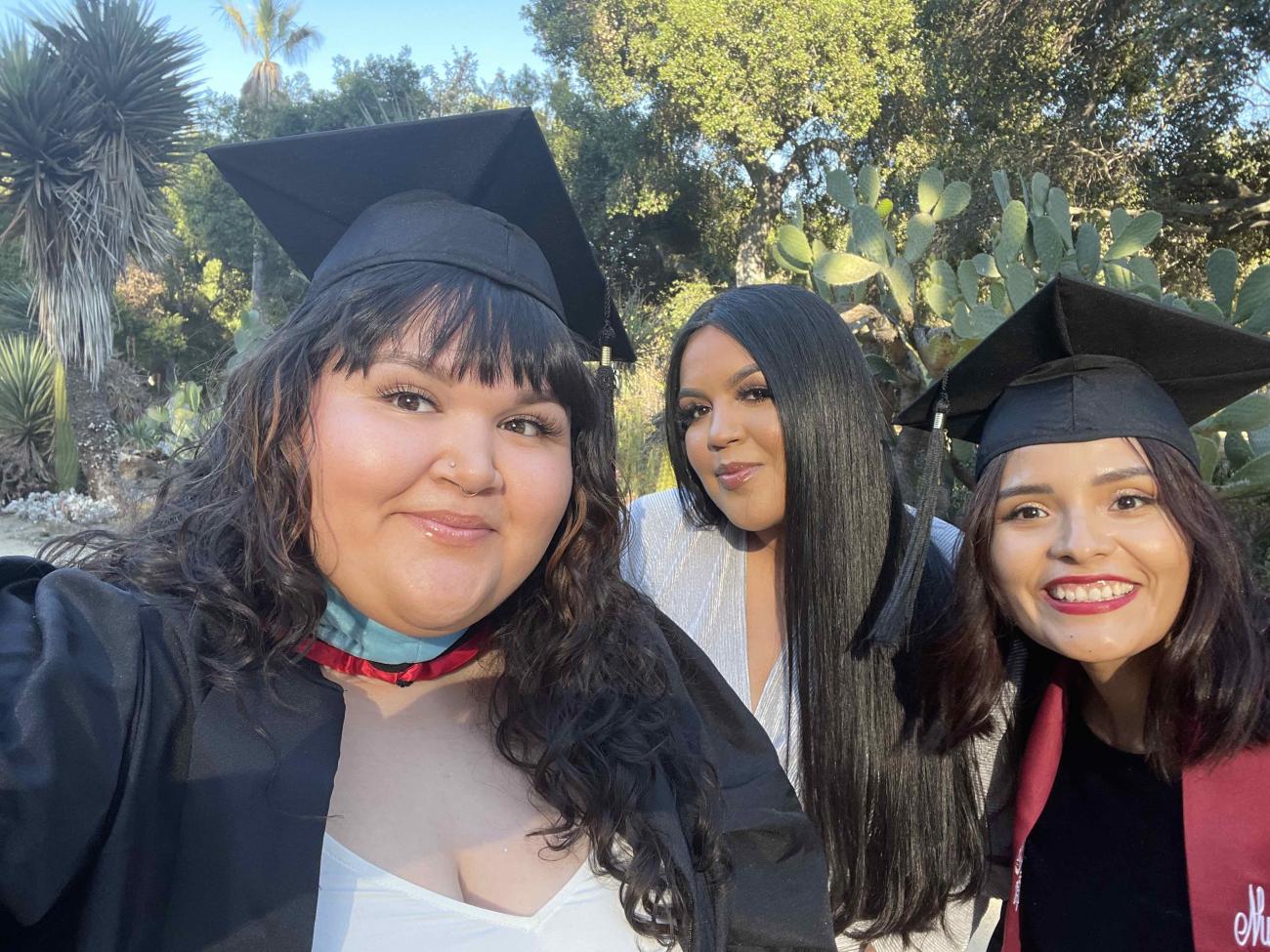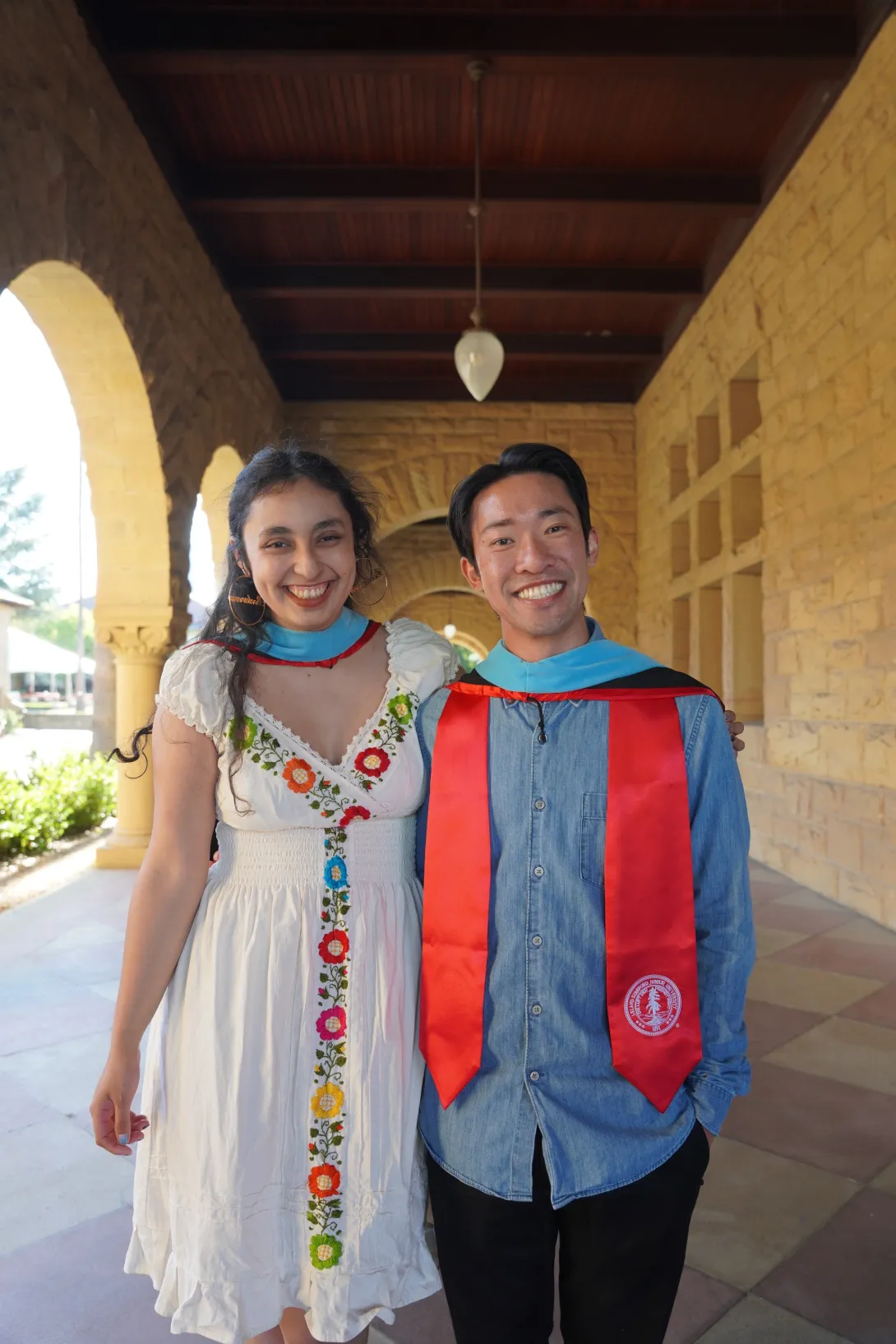
Stanford education students close the book on a year like no other
When Rob Heavner got word last summer that classes at Stanford Graduate School of Education would be online in the fall, with the COVID-19 pandemic showing no sign of subsiding, he considered taking advantage of the option offered to incoming GSE students to defer their enrollment for one year.
“I was definitely nervous. I toyed with the idea of deferring,” said Heavner, who had been working as a middle school teacher in Seattle before joining the GSE’s master’s program in Policy, Organizational and Leadership Studies (POLS) last fall. “But it was the right time for me to be going to graduate school. It was a transitional time in the world, [and a good] time for me to transition to something new.”
Heavner, who shared more about his experience this year in a podcast produced by the GSE’s Office of Innovation and Technology (IT), marked another transition this week as the GSE celebrated its 2021 graduates, an intrepid band of scholars who persevered through an extraordinary year of trials and uncertainty.
The GSE is conferring 104 master’s degrees this year – just over half that of recent years, due to the number of students who chose to defer their enrollment until Fall 2021. Sixteen doctoral students are expected to receive their PhD by the end of this summer, many having finished their dissertations under unpredictable circumstances and defending their work remotely. Thirty Stanford undergraduates were recognized for completing a minor or honor’s thesis at the GSE.
This year’s graduates were honored during a series of virtual gatherings this week, in addition to a university-wide, in-person commencement ceremony for advanced-degree recipients. An in-person GSE diploma ceremony is planned for next June, with graduates from 2020 and 2021 invited to join for a chance to walk the stage.
Positioned to innovate
Plenty has been said about the headaches and hurdles of remote learning, from screen fatigue and digital accessibility to the difficulty of building relationships online. For the majority of the GSE’s master’s students, the pandemic transformed the entirety of their year-long experience.
But as a community of educators, the GSE was keenly positioned to innovate in the digital learning space. The Stanford Teacher Education Program (STEP) quickly introduced new coursework on distance teaching and learning for its teacher candidates, drawing on the expertise of GSE faculty and doctoral students. In a series of programs facilitated by digital learning specialists at GSE IT, faculty and instructors from across the school shared emerging strategies with the community, with sessions on tactics and tools to enhance the online experience as well as practices for supporting students’ well-being and building trust online.
Karin Forssell, director of the master’s program in Learning Design and Technology (LDT) and a lecturer at the GSE, observed “a certain meta aspect to the experience” among her own students, whose very focus is to investigate ways of applying technology to educational challenges. “I definitely felt a willingness to explore how we use the tools of remote learning,” she said, “and to make it work in our classes.”
Preparing teachers without classrooms

New STEP graduates (l-r) Maria Bojorquez and Kelvin Mak
For students in STEP – a one-year program renowned in part for the hands-on leadership experience students gain through field placements at local schools – the impact of the pandemic was particularly acute.
When K-12 schools across the country closed last spring, STEP faculty questioned whether to cancel the program this year.
“As a professional preparation program, we have an obligation to the field to make sure that we’re preparing teachers who are ready to do the work that’s demanded of them, and we didn’t know what the teaching conditions would be like,” said Ira Lit, an associate professor at the GSE and director of STEP. “We also thought there could be health risks to our students if schools were open.”
In the end, he said, they decided they had a responsibility to move forward, with the necessary adjustments. “If schools were going to be available to their students in some way, shape or form, then we felt STEP should be engaged in that work alongside them.”
STEP candidates were still matched with school placements and experienced a range of scenarios, from exclusively remote to some in-person involvement.
“The STEP students’ ingenuity and flexibility and persistence was incredible,” said Lit. “It gives me real hope for the future because they demonstrated in so many different ways that they are ready for whatever challenges the world will bring.”
A new community-building opportunity
With their cohort sizes much smaller than usual, the GSE’s three other master’s programs – LDT, POLS and International Comparative Education/International Education Policy Analysis (ICE/IEPA) – experimented this year with an idea that never seemed feasible before the pandemic.
Every Friday morning, in a session preceding the weekly seminar for all three programs, students joined together online for Community Fridays, an initiative aimed at helping them to get to know each other, expand their professional networks and develop job-searching skills.
“The fact that we were all virtual made it possible to bring students across programs together in one place, weekly, for 30 or 45 minutes,” said Emi Kuboyama, director of professional networks for Stanford EdCareers, the GSE’s home for career education and professional learning.
During the first quarter, students took turns delivering a short “Who Am I?” talk to introduce themselves. “The smaller cohort sizes allowed us to include everybody who wanted to share their story,” Kuboyama said. Winter and spring sessions focused more on career topics, including geographically dispersed alumni guest speakers sharing their journeys.
Kuboyama said her team is exploring ways to build on the success of Community Fridays when the master’s programs resume in person, at their usual cohort size, this fall.
The pandemic also afforded new learning experiences for students embarking on a career in the classroom. Lit pointed out, for example, that one essential part of a teacher’s work, especially with younger students, is building a strong partnership with their families – something STEP students often have limited access to in their student teaching placements. But with parental involvement so integral to distance learning for young students, that work became front and center this year.
For new GSE graduates heading into the job market, the post-pandemic landscape could be more favorable than anyone expected, both economically and philosophically.
“There’s a lot of talk right now about how we don’t want to go back to the old ways of schooling,” said Christine Min Wotipka, an associate professor at the GSE and director of the ICE/IEPA master’s program. “We need people who can think creatively about how to remake education, and how to study it. Our graduates have excellent skills for a job market where people are hungry to figure out how to quantify the impact the pandemic has had on education, and where to go from here.”
Faculty mentioned in this article: Karin Forssell



